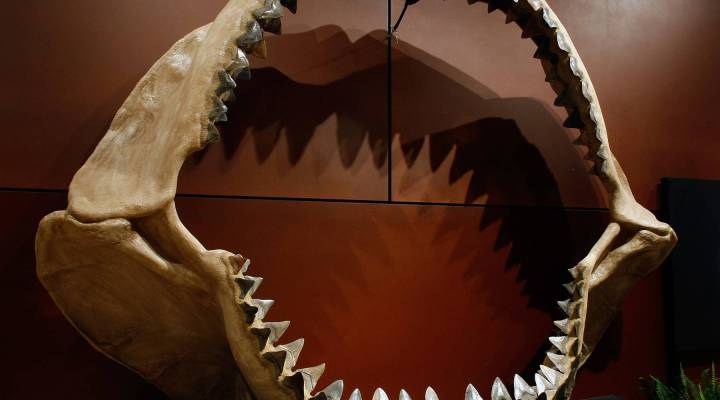
So long as sharks are terrifying, there will be shark content
So long as sharks are terrifying, there will be shark content

In 1975, “Jaws” became the first movie to gross over $100 million. Its success made it the first summer blockbuster. This summer’s shark offering is “The Meg,” a story about Carcharodon megalodon, the largest shark that ever lived. The movie is based on a novel written by Steve Alten, who saw “Jaws” when it came out and became obsessed with sharks. It turned out to be a lucrative obsession — sharks are a moneymaker. See: “Jaws.” And also Shark Week, starting up again this weekend, which launched in 1988 and is arguably the Discovery Channel’s most lucrative annual event. Plus, there’s a sixth “Sharknado” movie coming on Syfy in August. Alten’s written six books on the meg — the latest drops this week on his website — and he talked to Marketplace host Molly Wood about his relationship to the giant, extinct shark. The following is an edited transcript of their conversation.
Molly Wood: So you have essentially made an entire career out of shark stuff, so to speak. What is it about sharks that captivated you? What’s your personal connection to the Megalodon story?
Steve Alten: Well, it sort of started when I was 15 and saw “Jaws” in theaters. And that got me to read Peter Benchley’s book, and then I started reading everything I could find on great whites, true-life attack stories … and there was always a little blurb about Carcharocles megalodon, the prehistoric cousin of the great white. Well, flash ahead 20 years and I’m 35 years old, struggling to support a family of five, and I happened to pick up a Time magazine article in August of ’95 that featured the Mariana Trench, [once] the deepest part [of] the ocean. And the article talked about hydrothermal vents and life at the bottom of the ocean. And I thought, “You know, this would be a pretty cool place for that shark that I read about when I was younger to be hanging out. I wonder if it would be scientifically feasible.” So I went to the library and did some research — because there was no internet back then — and found out that it was feasible and that there was a big mystery about how these sharks disappeared. And I thought, “You know, I think I’m going to write the book.”
Wood: Why do you think that shark material, you know, from “Jaws” to Shark Week, now likely to this franchise, why is it such a consistent moneymaker?
Alten: Well, I mean, people like to be scared in the movies. And sharks are scary creatures, and great whites are the scariest of them all. Except for the megalodon, the big great white. So I think this movie is going to up the ante on it. But if it’s done well, then it can make for a movie that people want to see over and over again.
Wood: You mention the science aspect and that you did the research to see if it would actually be possible. Which, thank you for verifying my absolute worst fear: that the megalodon might be down there.
Alten: Well, are you planning a trip to the Mariana Trench anytime soon?
Wood: It’s going to come out! I already saw it in the trailer. So you mentioned the scientific aspect. A lot of criticism even of, for example, Shark Week and “Jaws” is that it’s not always very scientifically based and ends up demonizing sharks. Do you worry about that? Or does this have an answer to that?
Alten: Well, if you read the books, you’ll see that I’m very much into the ecology of the ocean and protecting sharks, and, in fact, in the book, they’re trying to capture it, not trying to kill it. But, you know, back when Benchley wrote “Jaws,” he got a lot of grief and felt horrible because sharks were being killed, you know, after “Jaws.” I think we’ve woken up to the fact that sharks are an integral part of the ocean’s ecology and health. And this ridiculous practice of killing these sharks for their fins to make soup, it’s just got to stop. And I will assure you that no megalodons were hurt in the filming of this movie.
There’s a lot happening in the world. Through it all, Marketplace is here for you.
You rely on Marketplace to break down the world’s events and tell you how it affects you in a fact-based, approachable way. We rely on your financial support to keep making that possible.
Your donation today powers the independent journalism that you rely on. For just $5/month, you can help sustain Marketplace so we can keep reporting on the things that matter to you.












